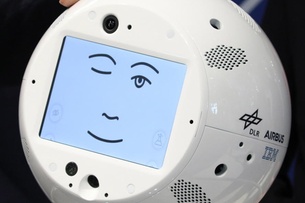People are in favour of taxing robots if unemployment increases as a result of technological advances. Only 34% of Swiss people believe their jobs are not at risk from automation and machine learning, according to a survey commissioned by the Swiss Broadcasting Corporation (SBC). Almost half of the 2,092 people surveyed by the Link Institute for SBC felt that some of their daily tasks could be done by machines and algorithms, while 15% were convinced that robots could do much of their work. Only 2% felt that they could be completely replaced by technology in the near future. Entrepreneurs, the self-employed and independent professionals consider their work to be least at risk from automation. On the other hand, more
Topics:
Swissinfo considers the following as important: 3) Swiss Markets and News, Featured, jobs, Latest News, newsletter, Swiss Broadcasting Corporation
This could be interesting, too:
Nachrichten Ticker - www.finanzen.ch writes Die Performance der Kryptowährungen in KW 9: Das hat sich bei Bitcoin, Ether & Co. getan
Nachrichten Ticker - www.finanzen.ch writes Wer verbirgt sich hinter der Ethereum-Technologie?
Martin Hartmann writes Eine Analyse nach den Lehren von Milton Friedman
Marc Chandler writes March 2025 Monthly

People are in favour of taxing robots if unemployment increases as a result of technological advances.
Only 34% of Swiss people believe their jobs are not at risk from automation and machine learning, according to a survey commissioned by the Swiss Broadcasting Corporation (SBC).
Almost half of the 2,092 people surveyed by the Link Institute for SBC felt that some of their daily tasks could be done by machines and algorithms, while 15% were convinced that robots could do much of their work. Only 2% felt that they could be completely replaced by technology in the near future.
Entrepreneurs, the self-employed and independent professionals consider their work to be least at risk from automation. On the other hand, more than one in three apprentices (35%) believe that at least a significant number of their daily tasks are at risk. If artificial intelligence (AI) and automation lead to increased unemployment, a so-called robot tax was considered the most useful compensation measure by respondents.
It is not just jobs where artificial intelligence is perceived as a risk. Privacy and democracy are also areas that respondents felt could be threatened by technology. In particular, people are concerned about military applications and access to personal political opinions and private data.
However, it is not all doom and gloom. Interviewees felt such technological advances offered opportunities in terms of health and everyday life. For example, AI could be used to boost public safety, robots could perform medical procedures and the technology could replace certain repetitive tasks carried out in public administrations.
Tags: Featured,jobs,Latest news,newsletter,Swiss Broadcasting Corporation
